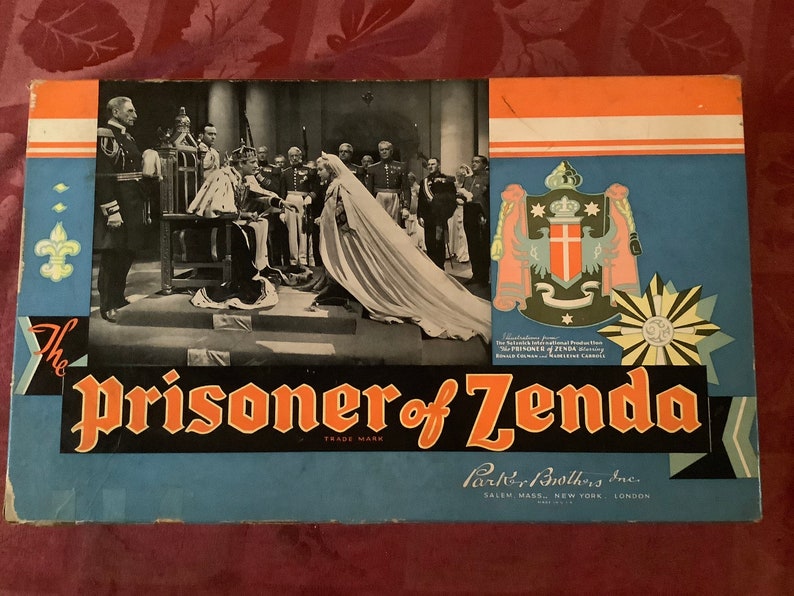

Calhern is solid and Greer was a strange find. Granger does well but his sudden transformation from innocent abroad into action hero at the end was a gear change too much. The final scenes were pretty good and it was a welcome arrival for sword fighting in a very talky film but I did wish there had been a bit more swagger to the rest of the film, if not actually action. Things get a bit better once the villains turn up but even then I was surprised by how plodding it was all delivered. It wasn't funny and it seemed to undercut the serious business of telling a good yarn. However the film opens with a sort of criss-cross humour that didn't really engage me at all. On paper I can see how fascinating it could have been because it has political intrigue, betrayals, sword fights and action. I must also confess that for the most part I found it quite dull. Despite the fact that it has been made many times, I must confess to this being the first time I've seen this story told. Rassendyll steps into the place of the King in a cunning ploy to keep the country steady however he finds himself in the midst of a much more serious ploy than drugged wine.

The next morning he wakes up with a sore head but the King is out for the count for much longer due to a drugged bottle of wine the work of his brother Michael, who seeks to claim the throne in the chaos that he hopes will follow the cancellation of the day's coronation. The two men spend all night drinking, a habit King Rudolf is oft to entertain but Rassendyll is a light weight and has fallen asleep long before the final bottles are opened. When he arrives in the country he gets some funny looks and, when he meets King Rudolf he understands why they are the total spit of one another, apart from a moustache. Try and figure out who could play these roles today with the flair of the players in this version, let alone the one from 1937.Įnglishman Rudolf Rassendyll travels to see his distant relative King Rudolf V. Something tells me we're far from done with The Prisoner Of Zenda. She knows what her obligations are and she too can't afford to follow her heart. As for Kerr her best scene is at the end when she realizes she has been hoodwinked, but in a scheme for the greater good of the kingdom. Personally why she falls for a cold fish that Michael is who can figure. But he's her man and when she does ever so slightly give in to the scheming Hentzau she regrets it when it means the death of her beloved. She loves a cold and forbidding man in Prince Michael, especially when played by Robert Douglas. I've always thought that Greer as Antoinette plays one of the most tragic characters in popular literature. The parts in relation to the hero are almost a carbon copy of the roles of Katharine DeVaucelles and Hugette from If I Were King. The women in the cast, Deborah Kerr and Jane Greer as Princess Flavia and Antoinette DeMauban respectively never come in for much discussion of their roles. We've seen over ten versions so far going back to the silent screen. Which begs the question whether we'll get yet another version when Prince Charles eventually assumes the throne. I've wondered whether someone over at MGM after George VI died in early 1952 whether they thought it was now time to do another remake of The Prisoner Of Zenda in time to coincide with the publicity of Queen Elizabeth II's coronation. The 1937 version benefited from having the world wide publicity of the constitutional crisis in the United Kingdom over Edward VIII choice of consort. Mason who has also played some of the best villains on screen keeps up the fine tradition for that role. took the Rupert part because he was advised it's one of the best villains ever created in drama. If Granger doesn't quite have Colman's flair for the spoken word and very few ever have, he makes a fine and dashing hero which parts he played very well, too well in his opinion on his career. The casting of Stewart Granger in the double role of Rudolph Rassendyll and his royal cousin, the Crown Prince Rudolph of Ruritania and James Mason as the villainous Rupert of Hentzau is hardly some stock company casting. If it doesn't quite have the panache of the Colman film, it makes up for it with the introduction of some nice color cinematography.
THE PRISONER OF ZENDA 1894 MOVIE
Next to the 1937 version with Ronald Colman and Douglas Fairbanks, Jr., this version of The Prisoner Of Zenda is the one most fondly remembered by movie audiences.


 0 kommentar(er)
0 kommentar(er)
